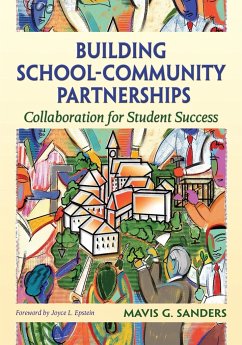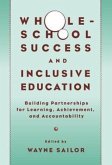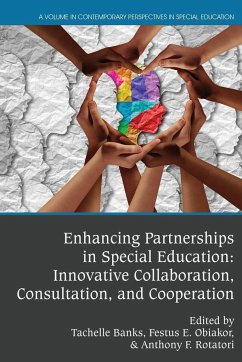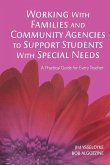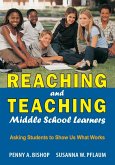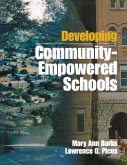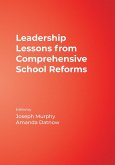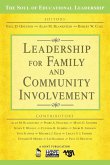- Broschiertes Buch
- Merkliste
- Auf die Merkliste
- Bewerten Bewerten
- Teilen
- Produkt teilen
- Produkterinnerung
- Produkterinnerung
How can we partner with our communities to improve school programs increase students' success? Community involvement is a powerful tool in generating resources essential for educational excellence. This sharp, insightful book is an excellent resource for educators seeking to establish school-community partnerships to achieve goals for their schools, students, and communities. Work successfully with community partners to improve school programs, strengthen families, and expand students' learning experiences by collaborating with community partners such as: Businesses and corporations…mehr
Andere Kunden interessierten sich auch für
![Whole-School Success and Inclusive Education: Building Partnerships for Learning, Achievement, and Accountability Whole-School Success and Inclusive Education: Building Partnerships for Learning, Achievement, and Accountability]() Wayne SailorWhole-School Success and Inclusive Education: Building Partnerships for Learning, Achievement, and Accountability33,99 €
Wayne SailorWhole-School Success and Inclusive Education: Building Partnerships for Learning, Achievement, and Accountability33,99 €![Enhancing Partnerships in Special Education Enhancing Partnerships in Special Education]() Enhancing Partnerships in Special Education64,99 €
Enhancing Partnerships in Special Education64,99 €![Working With Families and Community Agencies to Support Students With Special Needs Working With Families and Community Agencies to Support Students With Special Needs]() Jim YsseldykeWorking With Families and Community Agencies to Support Students With Special Needs29,99 €
Jim YsseldykeWorking With Families and Community Agencies to Support Students With Special Needs29,99 €![Reaching and Teaching Middle School Learners Reaching and Teaching Middle School Learners]() Penny A. BishopReaching and Teaching Middle School Learners36,99 €
Penny A. BishopReaching and Teaching Middle School Learners36,99 €![Developing Community-Empowered Schools Developing Community-Empowered Schools]() Mary Ann BurkeDeveloping Community-Empowered Schools37,99 €
Mary Ann BurkeDeveloping Community-Empowered Schools37,99 €![Leadership Lessons from Comprehensive School Reforms Leadership Lessons from Comprehensive School Reforms]() Joseph MurphyLeadership Lessons from Comprehensive School Reforms47,99 €
Joseph MurphyLeadership Lessons from Comprehensive School Reforms47,99 €![Leadership for Family and Community Involvement Leadership for Family and Community Involvement]() Paul D. HoustonLeadership for Family and Community Involvement37,99 €
Paul D. HoustonLeadership for Family and Community Involvement37,99 €-
-
-
How can we partner with our communities to improve school programs increase students' success? Community involvement is a powerful tool in generating resources essential for educational excellence. This sharp, insightful book is an excellent resource for educators seeking to establish school-community partnerships to achieve goals for their schools, students, and communities. Work successfully with community partners to improve school programs, strengthen families, and expand students' learning experiences by collaborating with community partners such as: Businesses and corporations Universities and higher learning institutions National and local volunteer organizations Social service agencies and health partners Faith-based organizations
Hinweis: Dieser Artikel kann nur an eine deutsche Lieferadresse ausgeliefert werden.
Hinweis: Dieser Artikel kann nur an eine deutsche Lieferadresse ausgeliefert werden.
Produktdetails
- Produktdetails
- Verlag: Corwin
- Seitenzahl: 144
- Erscheinungstermin: 2. November 2005
- Englisch
- Abmessung: 254mm x 178mm x 8mm
- Gewicht: 286g
- ISBN-13: 9781412917650
- ISBN-10: 1412917654
- Artikelnr.: 20968874
- Herstellerkennzeichnung
- Produktsicherheitsverantwortliche/r
- Europaallee 1
- 36244 Bad Hersfeld
- gpsr@libri.de
- Verlag: Corwin
- Seitenzahl: 144
- Erscheinungstermin: 2. November 2005
- Englisch
- Abmessung: 254mm x 178mm x 8mm
- Gewicht: 286g
- ISBN-13: 9781412917650
- ISBN-10: 1412917654
- Artikelnr.: 20968874
- Herstellerkennzeichnung
- Produktsicherheitsverantwortliche/r
- Europaallee 1
- 36244 Bad Hersfeld
- gpsr@libri.de
Mavis G. Sanders is assistant professor of education in the School of Professional Studies in Business and Education, research scientist at the Center for Research on the Education of Students Placed at Risk (CRESPAR), and senior advisor to the National Network of Partnership Schools at Johns Hopkins University. She is the author of many articles on the effects of school, family, and community support on African American adolescents' school success, the impact of partnership programs on the quality of family and community involvement, and international research on partnerships. She is interested in how schools involve families that are traditionally hard to reach, how schools meet challenges for implementing excellent programs and practices, and how schools define "community" and develop meaningful school-family-community connections. Her most recent book is Schooling Students Placed at Risk: Research, Policy, and Practice in the Education of Poor and Minority Adolescents (Lawrence Erlbaum, 2000). She earned her PhD in education from Stanford University.
Foreword by Joyce L. Epstein
Preface
Acknowledgments
About the Author
1. Community Involvement: Why and What?
Rationales for Community Involvement in Schools
Community Involvement in Schools: Form and Fashion
Obstacles to Community Partnerships
Summary
2. A Closer Look at Common Community Partnerships
Business Partnerships
University Partnerships
Service Learning Partnerships
School-Linked Service Integration
Faith-Based Partnerships
Summary
3. Components of Successful Community Partnerships
High-Functioning Schools
Student-Centered Learning Environments
Effective Partnership Teams
Principal Leadership
External Support
Summary
4. Building Capacity for Successful Community Partnerships: A Vignette
The School
The Goal
The Team
The Project
The Community Partners
The Results
Lessons Learned
Summary
5. Bringing the Community In: An Elementary School Story
Background
Community Partners
Commitment to Students' Learning
Principal Leadership
Action Team for Partnerships
Welcoming School Climate
Two-Way Communication
Summary
6. Creating Closer Community Ties: A High School Study
Background
Principal Leadership
A Student Focus
Community Partners and Activities
Summary
7. Promising Practices for Community Partnerships
Activity 1: Goal--Improve Reading (2004)
Activity 2: Goal--Improve Math Skills (2003)
Activity 3: Goal--Increase Students¿ Awareness of Career Opportunities
(2001)
Activity 4: Goal--Improve Ninth-Grade Performance on State Proficiency Exam
(2002)
Activity 5: Goal--Improve Student Writing and Technology Skills (2002)
Activity 6: Goal--Improve Student Reading (2002)
Activity 7: Goal--Improve School Landscaping (2002)
Activity 8: Goal--Provide Community Service (2002)
Activity 9: Goal--Improve Student Oral and Written Communication (2004)
Activity 10: Goal--Improve Facilities for Students With Disabilities (2004)
Activity 11: Goal--Improve Student Science Skills (2000)
Activity 12: Goal--Provide Afterschool Activities for Middle School
Students (2000)
Summary
8. Preparing Educational Leaders for Community Partnerships: A Workshop
Agenda
Building Community Partnerships Agenda
Summary
9. Concluding Thoughts
Resource A: Sample Activities
Activity 1: Locating Community Partners
Activity 2: Improving the Partnership Process
Activity 3: Improving Community Partnership Quality
Activity 4: Garnering Principal Support for Partnerships
Resource B: Sample Letters
Sample Letter 1: Partnership Communication
Sample Letter 2: Partnership Activity Follow-Up
Endnotes
References
Index
Preface
Acknowledgments
About the Author
1. Community Involvement: Why and What?
Rationales for Community Involvement in Schools
Community Involvement in Schools: Form and Fashion
Obstacles to Community Partnerships
Summary
2. A Closer Look at Common Community Partnerships
Business Partnerships
University Partnerships
Service Learning Partnerships
School-Linked Service Integration
Faith-Based Partnerships
Summary
3. Components of Successful Community Partnerships
High-Functioning Schools
Student-Centered Learning Environments
Effective Partnership Teams
Principal Leadership
External Support
Summary
4. Building Capacity for Successful Community Partnerships: A Vignette
The School
The Goal
The Team
The Project
The Community Partners
The Results
Lessons Learned
Summary
5. Bringing the Community In: An Elementary School Story
Background
Community Partners
Commitment to Students' Learning
Principal Leadership
Action Team for Partnerships
Welcoming School Climate
Two-Way Communication
Summary
6. Creating Closer Community Ties: A High School Study
Background
Principal Leadership
A Student Focus
Community Partners and Activities
Summary
7. Promising Practices for Community Partnerships
Activity 1: Goal--Improve Reading (2004)
Activity 2: Goal--Improve Math Skills (2003)
Activity 3: Goal--Increase Students¿ Awareness of Career Opportunities
(2001)
Activity 4: Goal--Improve Ninth-Grade Performance on State Proficiency Exam
(2002)
Activity 5: Goal--Improve Student Writing and Technology Skills (2002)
Activity 6: Goal--Improve Student Reading (2002)
Activity 7: Goal--Improve School Landscaping (2002)
Activity 8: Goal--Provide Community Service (2002)
Activity 9: Goal--Improve Student Oral and Written Communication (2004)
Activity 10: Goal--Improve Facilities for Students With Disabilities (2004)
Activity 11: Goal--Improve Student Science Skills (2000)
Activity 12: Goal--Provide Afterschool Activities for Middle School
Students (2000)
Summary
8. Preparing Educational Leaders for Community Partnerships: A Workshop
Agenda
Building Community Partnerships Agenda
Summary
9. Concluding Thoughts
Resource A: Sample Activities
Activity 1: Locating Community Partners
Activity 2: Improving the Partnership Process
Activity 3: Improving Community Partnership Quality
Activity 4: Garnering Principal Support for Partnerships
Resource B: Sample Letters
Sample Letter 1: Partnership Communication
Sample Letter 2: Partnership Activity Follow-Up
Endnotes
References
Index
Foreword by Joyce L. Epstein
Preface
Acknowledgments
About the Author
1. Community Involvement: Why and What?
Rationales for Community Involvement in Schools
Community Involvement in Schools: Form and Fashion
Obstacles to Community Partnerships
Summary
2. A Closer Look at Common Community Partnerships
Business Partnerships
University Partnerships
Service Learning Partnerships
School-Linked Service Integration
Faith-Based Partnerships
Summary
3. Components of Successful Community Partnerships
High-Functioning Schools
Student-Centered Learning Environments
Effective Partnership Teams
Principal Leadership
External Support
Summary
4. Building Capacity for Successful Community Partnerships: A Vignette
The School
The Goal
The Team
The Project
The Community Partners
The Results
Lessons Learned
Summary
5. Bringing the Community In: An Elementary School Story
Background
Community Partners
Commitment to Students' Learning
Principal Leadership
Action Team for Partnerships
Welcoming School Climate
Two-Way Communication
Summary
6. Creating Closer Community Ties: A High School Study
Background
Principal Leadership
A Student Focus
Community Partners and Activities
Summary
7. Promising Practices for Community Partnerships
Activity 1: Goal--Improve Reading (2004)
Activity 2: Goal--Improve Math Skills (2003)
Activity 3: Goal--Increase Students¿ Awareness of Career Opportunities
(2001)
Activity 4: Goal--Improve Ninth-Grade Performance on State Proficiency Exam
(2002)
Activity 5: Goal--Improve Student Writing and Technology Skills (2002)
Activity 6: Goal--Improve Student Reading (2002)
Activity 7: Goal--Improve School Landscaping (2002)
Activity 8: Goal--Provide Community Service (2002)
Activity 9: Goal--Improve Student Oral and Written Communication (2004)
Activity 10: Goal--Improve Facilities for Students With Disabilities (2004)
Activity 11: Goal--Improve Student Science Skills (2000)
Activity 12: Goal--Provide Afterschool Activities for Middle School
Students (2000)
Summary
8. Preparing Educational Leaders for Community Partnerships: A Workshop
Agenda
Building Community Partnerships Agenda
Summary
9. Concluding Thoughts
Resource A: Sample Activities
Activity 1: Locating Community Partners
Activity 2: Improving the Partnership Process
Activity 3: Improving Community Partnership Quality
Activity 4: Garnering Principal Support for Partnerships
Resource B: Sample Letters
Sample Letter 1: Partnership Communication
Sample Letter 2: Partnership Activity Follow-Up
Endnotes
References
Index
Preface
Acknowledgments
About the Author
1. Community Involvement: Why and What?
Rationales for Community Involvement in Schools
Community Involvement in Schools: Form and Fashion
Obstacles to Community Partnerships
Summary
2. A Closer Look at Common Community Partnerships
Business Partnerships
University Partnerships
Service Learning Partnerships
School-Linked Service Integration
Faith-Based Partnerships
Summary
3. Components of Successful Community Partnerships
High-Functioning Schools
Student-Centered Learning Environments
Effective Partnership Teams
Principal Leadership
External Support
Summary
4. Building Capacity for Successful Community Partnerships: A Vignette
The School
The Goal
The Team
The Project
The Community Partners
The Results
Lessons Learned
Summary
5. Bringing the Community In: An Elementary School Story
Background
Community Partners
Commitment to Students' Learning
Principal Leadership
Action Team for Partnerships
Welcoming School Climate
Two-Way Communication
Summary
6. Creating Closer Community Ties: A High School Study
Background
Principal Leadership
A Student Focus
Community Partners and Activities
Summary
7. Promising Practices for Community Partnerships
Activity 1: Goal--Improve Reading (2004)
Activity 2: Goal--Improve Math Skills (2003)
Activity 3: Goal--Increase Students¿ Awareness of Career Opportunities
(2001)
Activity 4: Goal--Improve Ninth-Grade Performance on State Proficiency Exam
(2002)
Activity 5: Goal--Improve Student Writing and Technology Skills (2002)
Activity 6: Goal--Improve Student Reading (2002)
Activity 7: Goal--Improve School Landscaping (2002)
Activity 8: Goal--Provide Community Service (2002)
Activity 9: Goal--Improve Student Oral and Written Communication (2004)
Activity 10: Goal--Improve Facilities for Students With Disabilities (2004)
Activity 11: Goal--Improve Student Science Skills (2000)
Activity 12: Goal--Provide Afterschool Activities for Middle School
Students (2000)
Summary
8. Preparing Educational Leaders for Community Partnerships: A Workshop
Agenda
Building Community Partnerships Agenda
Summary
9. Concluding Thoughts
Resource A: Sample Activities
Activity 1: Locating Community Partners
Activity 2: Improving the Partnership Process
Activity 3: Improving Community Partnership Quality
Activity 4: Garnering Principal Support for Partnerships
Resource B: Sample Letters
Sample Letter 1: Partnership Communication
Sample Letter 2: Partnership Activity Follow-Up
Endnotes
References
Index

